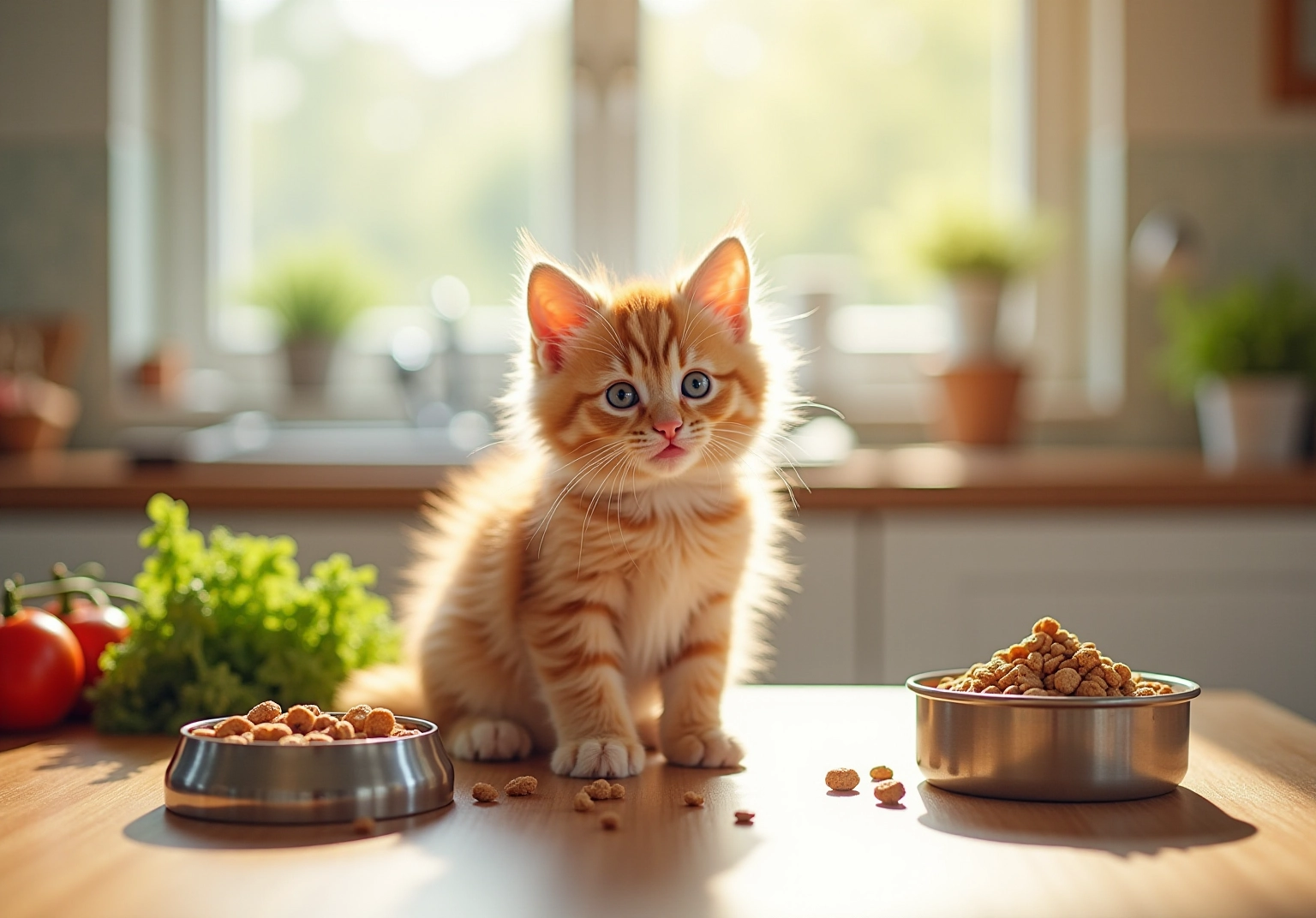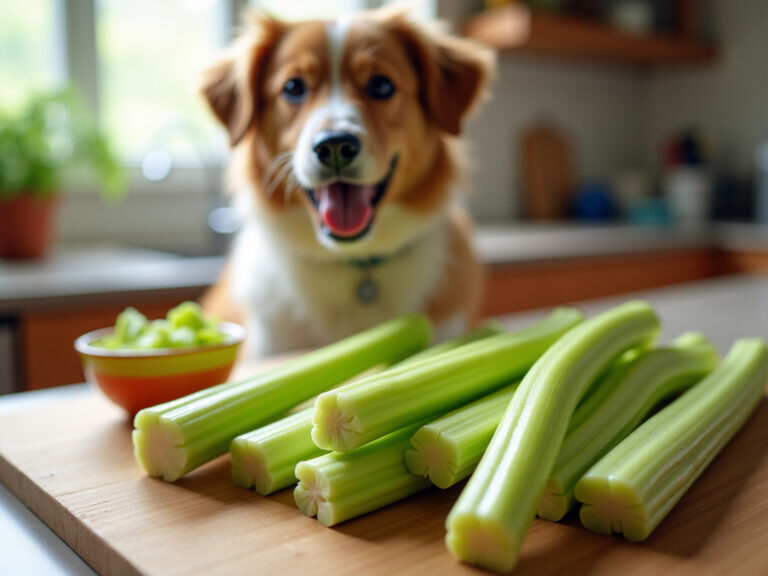4 Key Factors for Choosing the Best Kitten Food
Overview
Choosing the best food for your furry family members is a heartfelt decision that requires careful consideration. As you navigate this journey, think about:
- High-quality protein content
- Appropriate fat levels
- Essential vitamins and minerals
Remember, the reputation of the brand you choose is just as important. This article gently outlines these criteria, emphasizing the significance of meeting the specific nutritional needs of kittens to support their growth and development.
At Adventure Den, we understand the emotional investment you have in your pet’s well-being. We provide detailed insights into evaluating food options, ensuring that you can make informed choices for your little companions. By focusing on their unique needs, you can create a nurturing environment that allows them to thrive.
Let’s embark on this journey together, ensuring your kittens receive the best care possible. Your commitment to their health is commendable, and with the right information, you can confidently choose the food that will help them grow into happy, healthy cats.
Introduction
Choosing the right food for your kitten is a vital decision that can profoundly influence their growth and overall health. With their unique nutritional needs, understanding what makes the best kitten food is essential for pet owners who want to give their furry family members the best start in life. Yet, with so many options available, how can you determine which food truly meets these needs? This article explores four key factors that will empower you to make informed choices, ensuring your kittens receive the balanced nutrition necessary for a thriving life.
Understanding Kitten Nutritional Needs
Kittens have unique dietary needs that are best met by the best kitten food, which differ significantly from those of adult cats. As a loving pet owner, it’s essential to understand that the best kitten food must be rich in high-quality protein to support their rapid growth and development. Let’s explore the essential nutrients that will help your furry family members thrive:
- Protein: To support muscle development and overall health, kittens need a minimum of 30% protein in their diet. The National Research Council recommends at least 45g of protein per 1000kcal consumed, with an ideal allowance of 56.3g.
- Fat: A fat content of 18-25% is crucial for energy and aids in the absorption of fat-soluble vitamins. The NRC specifies a recommended fat allowance of 22.5g, with a maximum of 82.5g per 1000kcal.
- Vitamins and Minerals: Key vitamins such as A, D, and E, along with minerals like calcium and phosphorus, are vital for bone development and immune function. It’s important to ensure your kittens receive the best kitten food to provide a balanced intake of these nutrients that support their growing bodies.
- Taurine: This vital amino acid promotes heart health and vision, and must be included in formulations for young cats.
Understanding these dietary needs is essential for pet owners who wish to provide a nurturing environment. By ensuring your young cats receive a balanced diet, you are supporting their healthy growth and development, which is a cornerstone of their well-being.
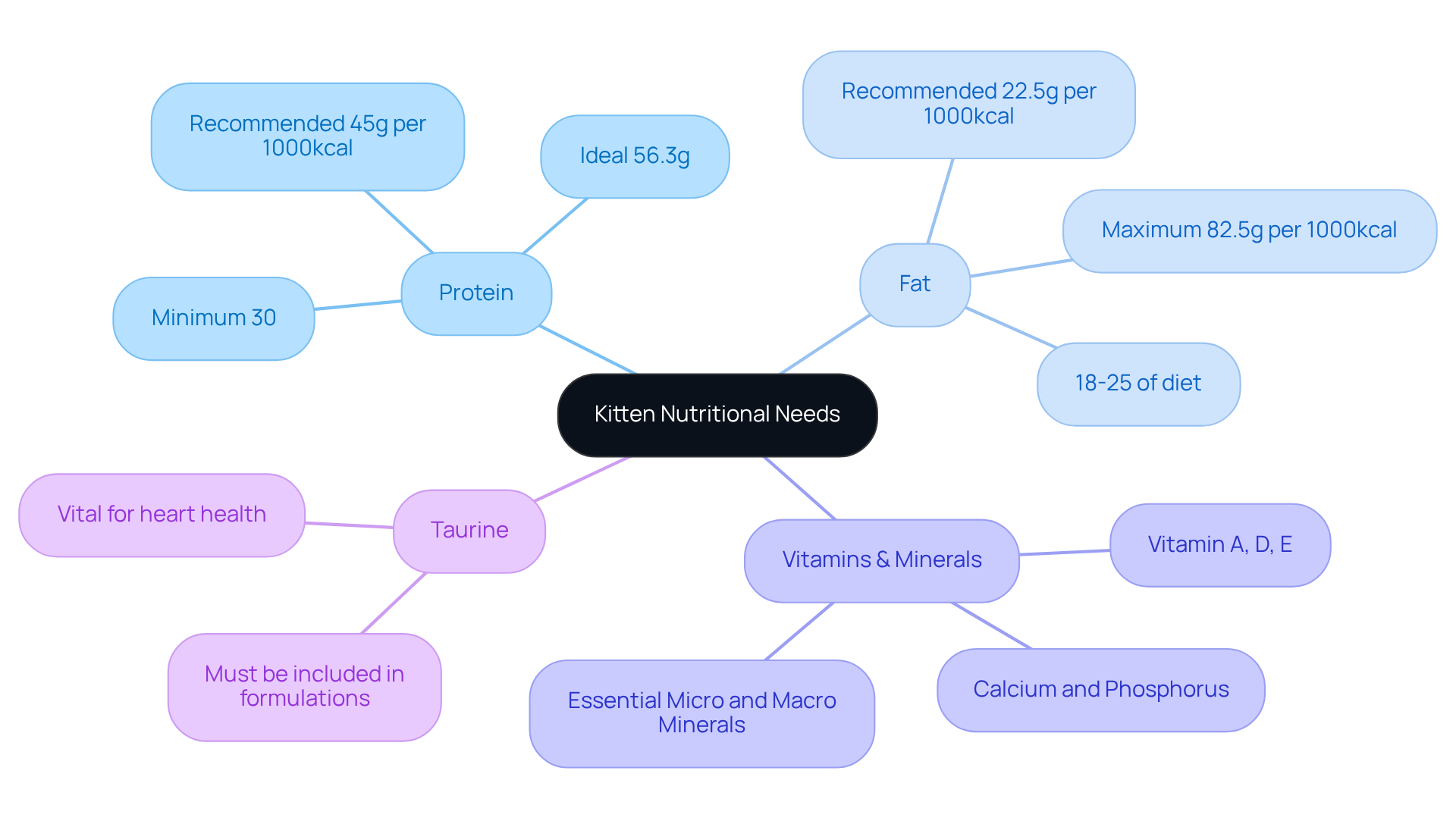
Criteria for Evaluating Kitten Food Brands
When evaluating kitten food brands, it’s crucial to consider a few key criteria that can make a world of difference for your furry family members:
-
Ingredient Quality: Prioritize high-quality animal proteins as the primary ingredient. Aim for at least 70 percent of your kitten’s daily diet to consist of muscle meat. It’s best to steer clear of fillers like corn or soy, as they offer minimal nutritional benefit.
-
Best Kitten Food: It is crucial to ensure that the best kitten food meets AAFCO (Association of American Feed Control Officials) standards for development and reproduction, which are essential for your young cat’s progress. The best kitten food generally contains higher amounts of protein, fat, calcium, and phosphorus compared to adult cat nutrition, making it vital for their growth.
-
Brand Reputation: Take the time to investigate the brand’s history, including any recall incidents and customer reviews related to the best kitten food. This assessment can help you gauge its reliability and commitment to quality. Checking for recall history is a critical aspect of evaluating a brand’s trustworthiness.
-
Formulation Type: Choose between wet and dry options based on your kitten’s preferences and dietary needs. Wet food typically has higher moisture content, aiding in hydration, which is essential for young cats. Kittens should be fed free-choice from about 8 weeks to around 6 months to support their development.
-
Price vs. Quality: While premium brands may come with a higher price tag, they often provide superior nutrition, contributing to long-term health benefits for your young cat. For instance, Wellness Complete Health Grain-Free Whitefish & Tuna Entrée Wet Canned Kitten Food is priced at $67.92, reflecting its quality ingredients and nutritional benefits.
By keeping these standards in mind, you’ll be well-equipped to choose the best kitten food for your young cats, ensuring they receive the vital nutrients required for healthy advancement and development. Remember, your commitment to their diet is a significant step towards nurturing their growth and happiness.
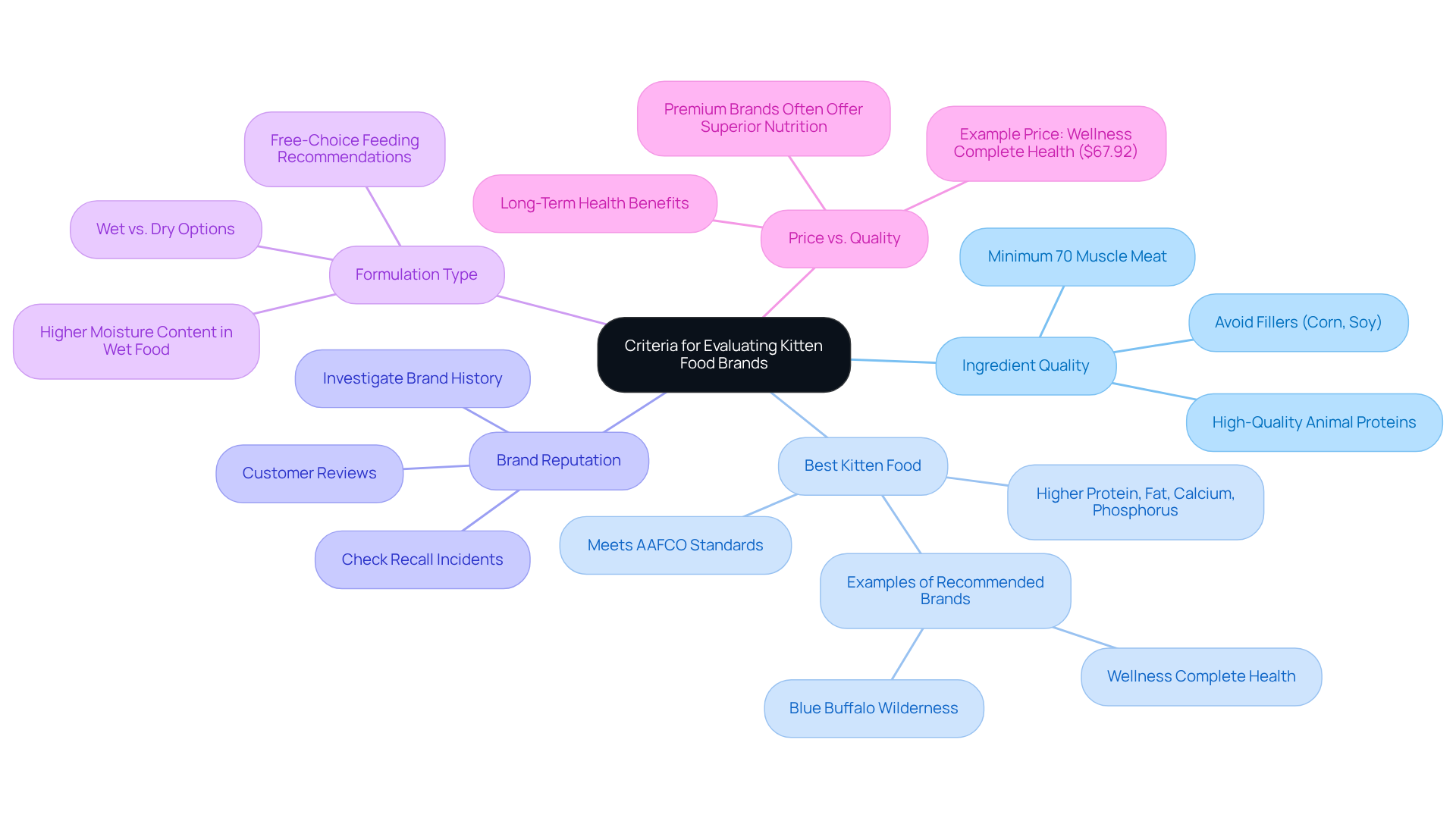
Comparative Analysis of Leading Kitten Food Brands
This comparative analysis thoughtfully examines three prominent kitten food brands, highlighting their key ingredients, nutritional content, and price points:
-
Brand: Royal Canin
- Key Ingredients: Chicken, rice, fish oil
- Protein Content: 36%
- Fat Content: 20%
- Price Range: $$
-
Brand: Purina Pro Plan
- Key Ingredients: Chicken, corn gluten meal, fish meal
- Protein Content: 40%
- Fat Content: 18%
- Price Range: $
-
Brand: Hill’s Science Diet
- Key Ingredients: Chicken, barley, flaxseed oil
- Protein Content: 32%
- Fat Content: 16%
- Price Range: $$
Royal Canin is celebrated for its tailored nutrition, featuring high protein content that supports growth and development, along with excellent digestibility. As Dr. Leon Whitney underscores, “The care of animals is a fundamental aspect of the ethical code of veterinary medicine,” emphasizing the significance of offering quality nutrition for your furry family members.
Purina Pro Plan is considered one of the best kitten food options as it strikes a balance between protein and fat, making it a budget-friendly choice for many pet owners. Its inclusion of probiotics supports digestive health, which is essential for young cats. This aligns with the commitment of veterinarians to ensure the health needs of animals are met, as noted by Tom Meyer, President of AVMA, who states that veterinarians promise to protect animal health and welfare.
Hill’s Science Diet is often suggested by veterinarians as the best kitten food because it highlights premium components and provides well-rounded nutrition to ensure young cats receive vital nutrients for their overall health. The insights from veterinarians emphasize the importance of selecting the appropriate nutrition, as they are uniquely trained to prescribe medicine for various species, reflecting their expertise in animal care.
This analysis enables pet owners to make informed choices based on their cats’ particular dietary requirements and budget considerations, while also acknowledging the emotional support veterinarians offer to pet owners in their journey of pet care.
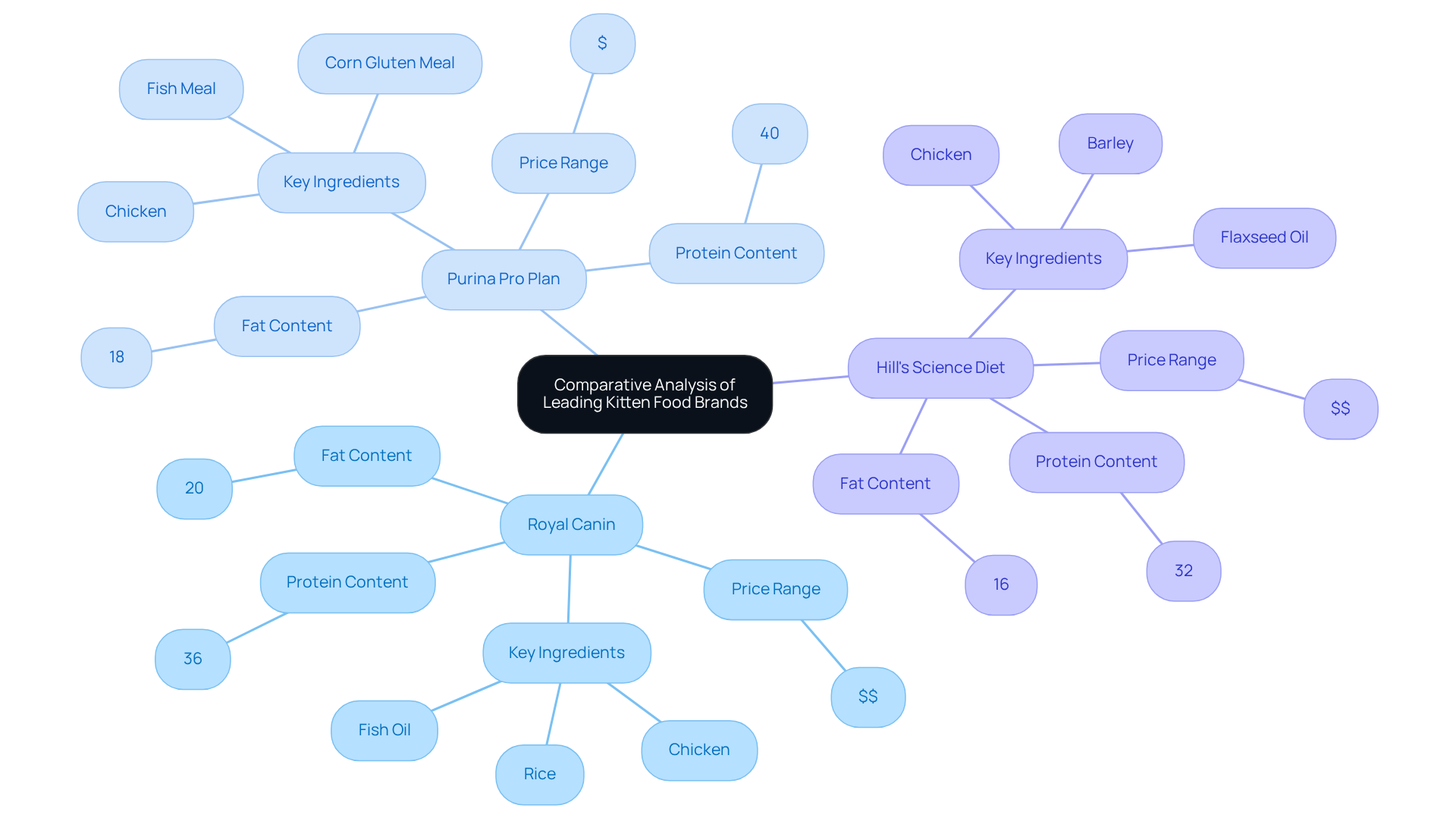
Recommendations for Choosing the Best Kitten Food
When it comes to choosing the best food for your precious kitten, it’s essential to keep their unique needs in mind. Here are some heartfelt recommendations to guide you:
- Prioritize Protein: Look for foods that list high-quality animal protein as the first ingredient. This is vital for supporting your kitten’s growth and development.
- Consider Life Stage: Ensure that the food is specifically formulated for young cats. Their nutritional needs are distinct from those of adult felines, and it’s important to cater to them.
- Monitor Your Young Cat’s Health: Keep a close eye on your kitten’s energy levels, coat condition, and overall health. As they grow and become more active, be ready to adjust their diet accordingly.
- Consult Your Veterinarian: Always reach out to your veterinarian for personalized advice tailored to your kitten’s health and dietary needs. Their expertise is invaluable in ensuring your furry family member thrives.
- Experiment with Different Brands: If your little one is a picky eater, don’t hesitate to try various brands and formulations. Finding the right match can make all the difference in meeting their nutritional requirements while satisfying their taste.
By following these nurturing recommendations, you can help ensure your kitten receives the best kitten food for a healthy and happy start in life.
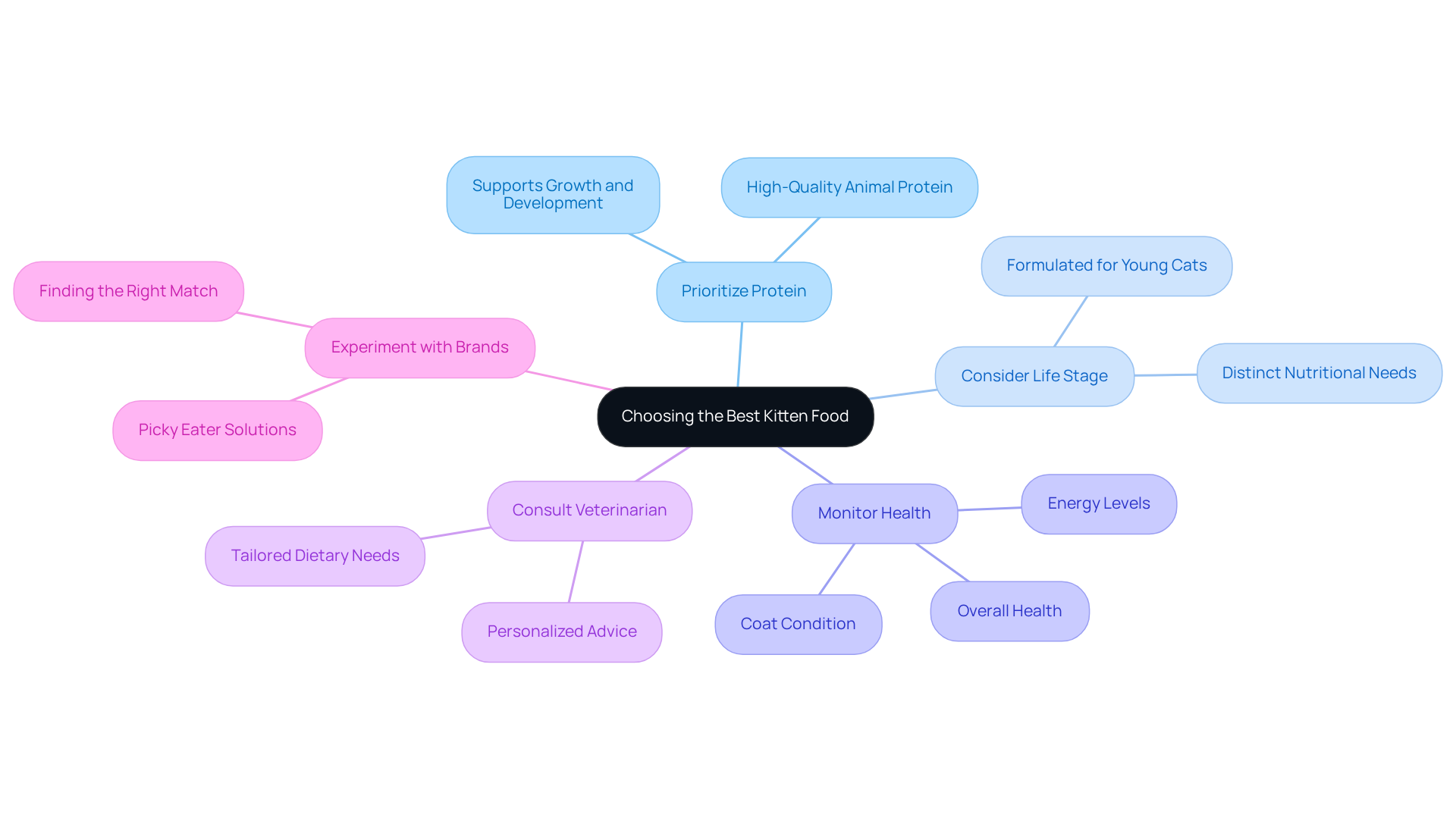
Conclusion
Choosing the right food for your kittens is a vital part of pet ownership that profoundly impacts their growth, health, and happiness. It’s important to understand their unique nutritional needs, which are quite different from those of adult cats. A well-balanced diet, rich in high-quality protein, fats, vitamins, and minerals, lays the groundwork for a thriving feline companion.
This article explores the specific dietary requirements of kittens, highlighting the significance of protein, fat, vitamins, minerals, and taurine. It outlines essential criteria for evaluating kitten food brands, such as:
- Ingredient quality
- Brand reputation
- Formulation type
A comparative analysis of leading brands like Royal Canin, Purina Pro Plan, and Hill’s Science Diet offers valuable insights into their nutritional content and price points, equipping you with the information necessary to make informed decisions.
Ultimately, selecting the best kitten food transcends merely meeting nutritional standards; it reflects a heartfelt commitment to nurturing a healthy and joyful life for your young cats. By prioritizing protein, monitoring their health, and consulting with veterinarians, you can ensure your kittens receive the best possible start. Embracing these recommendations will guide you toward informed choices that support the well-being of your furry family members, fostering a bond built on love and care.
Frequently Asked Questions
What are the unique dietary needs of kittens compared to adult cats?
Kittens have unique dietary needs that differ significantly from those of adult cats. They require a diet rich in high-quality protein to support their rapid growth and development.
How much protein do kittens need in their diet?
Kittens need a minimum of 30% protein in their diet. The National Research Council recommends at least 45g of protein per 1000kcal consumed, with an ideal allowance of 56.3g.
What is the recommended fat content for kitten food?
The recommended fat content for kitten food is between 18-25%. The NRC specifies a recommended fat allowance of 22.5g, with a maximum of 82.5g per 1000kcal.
Why are vitamins and minerals important for kittens?
Key vitamins such as A, D, and E, along with minerals like calcium and phosphorus, are vital for bone development and immune function in kittens. A balanced intake of these nutrients is essential for their growing bodies.
What role does taurine play in a kitten’s diet?
Taurine is a vital amino acid that promotes heart health and vision, and it must be included in formulations for young cats.
How can pet owners ensure their kittens receive a balanced diet?
Pet owners can ensure their kittens receive a balanced diet by providing the best kitten food that meets the nutritional requirements, supporting their healthy growth and development.

